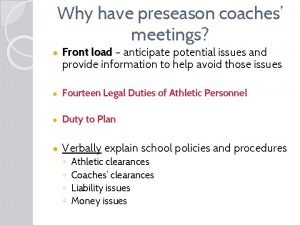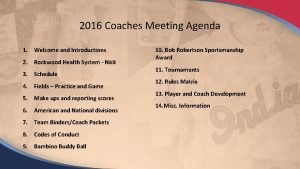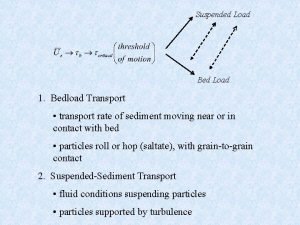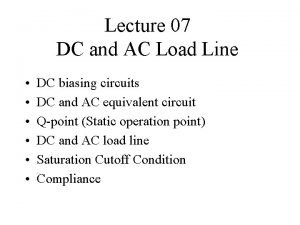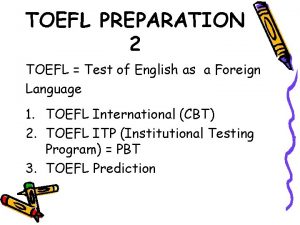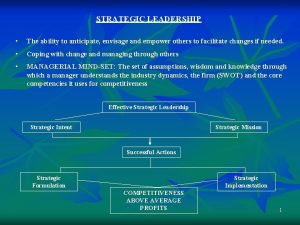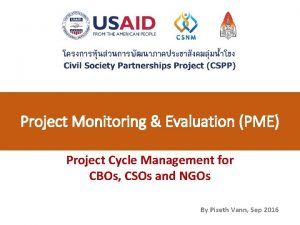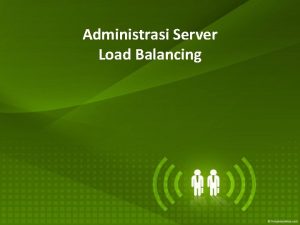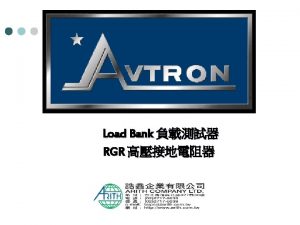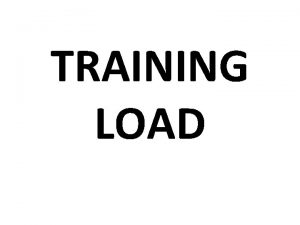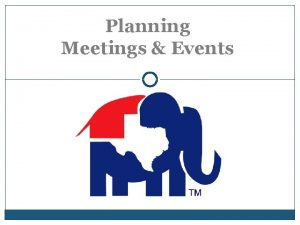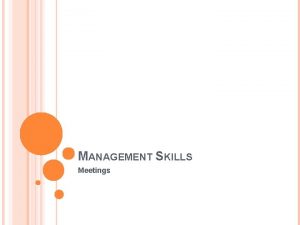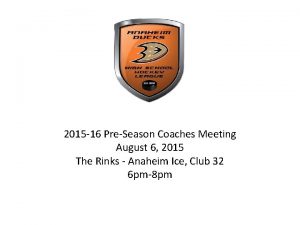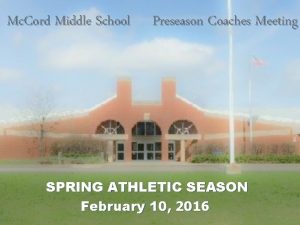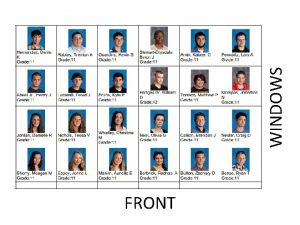Why have preseason coaches meetings Front load anticipate













- Slides: 13

Why have preseason coaches’ meetings? ● Front load – anticipate potential issues and provide information to help avoid those issues ● Fourteen Legal Duties of Athletic Personnel ● Duty to Plan ● Verbally explain school policies and procedures ◦ ◦ Athletic clearances Coaches’ clearances Liability issues Money issues

Background • Lakewood High School • Location: Lakewood, California (Long Beach Unified School District) • Enrollment – 3500 • League Affiliation – Harry J. Moore League • 22 Boys’ and Girls’ varsity sports • Boys’ AD and Girls’ AD share responsibilites

Fourteen Legal Duties of Athletic Personnel ● Duty to Plan � Have a yearly plan, keep it, and follow it � Prevent or reduce injury and loss by developing responsive strategies in: � Coaching competence � Medical screening � Appropriate activities that consider age, maturity, and environmental conditions � Injury response � Warnings to athletes and their families � Child advocacy in cases of alcohol and other drug abuse or family neglect or abuse ● Duty to Supervise � A coach must be: � Physically present � Provide competent instruction � Structure practices that are appropriate for the age and maturity of players � Prevent foreseeable injuries and respond to injury or trauma in an approved manner � This duty requires supervisors to ensure that facilities are locked and that students are denied access when a competent staff member cannot be physically present to supervise � A coach must also supervise the condition, safe usage, maintenance and upkeep of equipment and facilities ● Duty to Assess an Athlete’s Readiness for Practice and Competition � Coaches are required to access the health and physical or maturational readiness skills and physical condition of athletes � Athletes must be medically screened in accordance with CIF regulations before participating in tryouts, practice, or competition � Injured athletes who require the services of a physician may not return to practice or competition without written permission of the physician ● Duty to Maintain Safe Playing Conditions � Coaches are considered trained professionals who possess a higher level of knowledge and skill that permits them to identify foreseeable causes of injury inherent in defective equipment or hazardous environments � Weather conditions must be considered and athletes should not be subjected to intense or prolonged conditioning during periods of extreme heat and humidity � A plan for monitoring and responding to dangerous weather conditions is necessary

● Duty to Provide Proper Equipment � Coaches must ensure that athletes are properly equipped with clean, durable and safe equipment � Protective equipment must carry a NOCSAE (National Operating Commission on Safety in Athletic Equipment) certification and must be checked for proper fit and wearing � Athletes must wear protective equipment any time they are exposed to the full rigors of contact in practice or competition ● Duty to Instruct Properly � Athletic practices must be characterized by instruction that accounts for a logical sequence of fundamentals that lead to an enhanced progression of player knowledge, skill and capability � Instruction must demonstrate appropriate and safe technique and must include warning about unsafe technique and prohibited practices ● Duty to Match Athletes During Practice � Athletes in practices should be matched with consideration for: � Maturity � Skill � Age � Size � Speed ● Duty to Condition Properly � Practices must account for a progression of cardiovascular and musculoskeletal conditioning regimens that prepare athletes sequentially for more challenging practices and competitive activities � Consideration must be given to weather, maturational and readiness factors Duty to Warn � Coaches are required to warn parents and athletes of unsafe practices specific to a sport and the potential for injury or death � A generic warning, signed by both athletes and parents is included in the physical packet but sport specific warnings should be included at the parent meetings for specific sports ● ● Duty to Ensure Athletes are Covered by Injury Insurance � Athletes must be cleared through the athletic office prior to participation and should not be allowed to participate without this clearance

● Duty to Provide Emergency Care � Coaches are expected to be able to administer approved, prioritized, standard first aid procedures in response to a range of traumatic injuries ● Duty to Develop/Follow an Emergency Response Plan � Plans must be in place to: � Manage uninjured team members while emergency care is being administered to an injured athlete � Ensure access to a stocked first aid kit, spine board and other emergency response equipment � Access to a telephone and ensure a timely call to EMS � Expedite rapid access by EMS to the injured athlete by stationing coaches or team members at driveways, parking lots, entry doors and remote hallways ● Duty to Provide Proper Transportation � District transportation should be utilized as much as possible for travel to athletic events � Ensure that all athletes are on the bus before it departs from an away contest � Coaches and/or parent drivers must have district volunteer driver forms to drive athletes ● Duty to Select, Train, and Supervise Coaches � Athletic administrators will be expected to ensure coaches are capable of providing safe conditions and activities as outlined in the preceding list of 13 duties

SAMPLE COACHES’ MEETING Agenda 1. Welcome 2. Review Athletic Handbook • Duty to Warn The handbook is an excellent resource to coaches, students and parents. **Due process for coaches**

3. Review Coaches’ Clearances ●Duty to Select, Train, and Supervise Coaches ●Duty to Provide Emergency Care (first aid/CPR) a. b. Review district and school coaching clearance procedures. ◦CIF ◦District ◦School hold head coaches responsible for the clearances of their staff

4. Student Clearances/Physicals • Duty to Assess an Athlete’s Readiness for Practice and Competition • Duty to Warn • Duty to Ensure Athletes are Covered by Injury Insurance a. b. c. Review District/School’s clearance procedures Emphasize CIF forms and procedures Explain where clearance packets can be found

5. Responsibilities and Representation • a. b. c. d. e. f. g. Duty to Supervise Coaches are on the clock 24/7/365. Increase in video technology usage Don’t make decisions that allow others to scrutinize your Integrity! Lower Level Coaches – Modeling Equipment/Weightroom/Gymnasiums Review accident report procedures “Hazing”

6. Fundraisers, Purchases and Budgets a. Review ASB policies and procedures when handling money b. Review Booster Club responsibilities c. Maintaining Budgets and Conducting Fundraisers 7. CIF and League Rules a. Be knowledgeable of rule changes/revisions and communicate to all levels, Athletic Directors, and Administration. b. CIF Blue Book available online (cifss. org) c. Address Athletic Director for current copies of the League bylaws for your sport.

8. Facilities Maintenance • • a. b. c. d. Duty to Provide Proper Equipment Duty to Maintain Safe Playing Conditions Report needed repairs and/or cleaning needs in a timely manner. Any issues of liability need to be reported immediately. On holiday’s or any other time custodians are not present, please ensure that facilities are secure before you leave campus. Do NOT change or alter any structures without prior approval from the District!

9. Supervision – athletic period ●Duty to Supervise a. b. c. All students must be supervised during 6 th Period! Student athletes not attending a contest must be supervised by a coach. Period 6 – Seniors/Non-Athletes cannot just “hang out”. They have two options; they can be removed from Period 6 with no credits, suit-up and participate with coach for the remainder of the semester.

10. Eligibility review eligibility regulations 11. Transportation • Duty to Provide Proper Transportation a. Review district/school transportation procedures 12. CIF protocol regarding concussions a. Review and be aware of CIF procedures relative to studentathletes with concussions. 13. Review Risk Management Plan • Duty to develop/follow an emergency response plan a. Review and be aware of site Risk Management Plan
 Preseason coaches meeting agenda
Preseason coaches meeting agenda Coaches meeting agenda
Coaches meeting agenda More bloody meetings
More bloody meetings Meetings bloody meetings
Meetings bloody meetings Meetings bloody meetings 5 points
Meetings bloody meetings 5 points Why why why why
Why why why why Taper roller bearing advantages and disadvantages
Taper roller bearing advantages and disadvantages Red dot
Red dot Pux
Pux Quiescent point
Quiescent point Skill 18: anticipate the topics
Skill 18: anticipate the topics Envisage vs anticipate
Envisage vs anticipate Anticipate
Anticipate Effective salespeople anticipate and handle
Effective salespeople anticipate and handle
